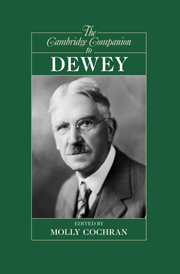Book contents
- Frontmatter
- Introduction
- 1 The making of a democratic philosopher: the intellectual development of John Dewey
- 2 Dewey’s epistemology
- 3 The naturalism of John Dewey
- 4 Dewey’s logic of inquiry
- 5 The primacy of practice in Dewey’s experimental empiricism
- 6 Cognitive science and Dewey’s theory of mind, thought, and language
- 7 John Dewey and action
- 8 Dewey’s moral philosophy
- 9 Ethics as moral inquiry: Dewey and the moral psychology of social reform
- 10 Dewey and pragmatic religious naturalism
- 11 Dewey’s aesthetics
- 12 Dewey’s philosophy of education: a critique from the perspective of care theory
- 13 Dewey’s vision of radical democracy
- 14 Dewey as an international thinker
- Bibliography
- Index
7 - John Dewey and action
Published online by Cambridge University Press: 28 September 2010
- Frontmatter
- Introduction
- 1 The making of a democratic philosopher: the intellectual development of John Dewey
- 2 Dewey’s epistemology
- 3 The naturalism of John Dewey
- 4 Dewey’s logic of inquiry
- 5 The primacy of practice in Dewey’s experimental empiricism
- 6 Cognitive science and Dewey’s theory of mind, thought, and language
- 7 John Dewey and action
- 8 Dewey’s moral philosophy
- 9 Ethics as moral inquiry: Dewey and the moral psychology of social reform
- 10 Dewey and pragmatic religious naturalism
- 11 Dewey’s aesthetics
- 12 Dewey’s philosophy of education: a critique from the perspective of care theory
- 13 Dewey’s vision of radical democracy
- 14 Dewey as an international thinker
- Bibliography
- Index
Summary
The concept of “action” is a key term in the humanities, the social sciences, and beyond. It has played a prominent role in sociology ever since it was established as an academic discipline in the late nineteenth century. In philosophy, it has always been linked with questions of practical rationality, and reemerged as a central topic of analytic philosophy in the second half of the twentieth century, pioneered in the work of Donald Davidson and others. More recently, new developments in cognitive science have attracted attention to hitherto neglected dimensions of the concept and its empirical foundations. As to sociology, Max Weber's famous Economy and Society opens with an enormously influential fourfold schema of types of social action, arranged according to their degree of rationality. Talcott Parsons' The Structure of Social Action synthesized the theoretical achievements of the “founding fathers,” using an action-theoretical framework and emphasizing the function of normative orientations for the social coordination of individual acts. It is easy to name more prominent sociologists standing for the importance of action theory in the discipline, among them Dewey's friend George Herbert Mead whose approach to action arguably offers the most radical alternative to methodological individualism.
- Type
- Chapter
- Information
- The Cambridge Companion to Dewey , pp. 145 - 165Publisher: Cambridge University PressPrint publication year: 2010
- 11
- Cited by



